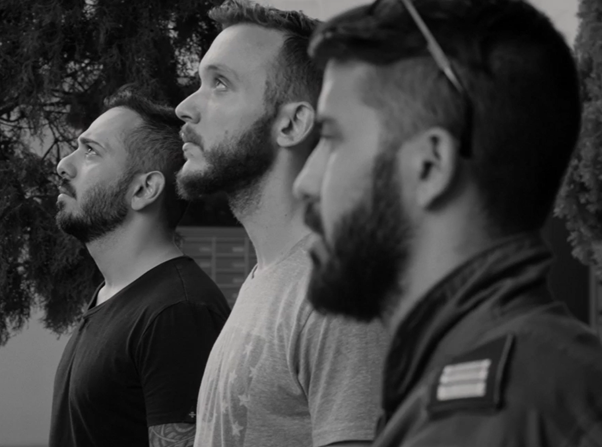click to dowload our latest edition
CLICK HERE TO SUBSCRIBE TO OUR NEWSLETTER


Published
2 years agoon
A year ago, the Durban International Film Festival (DIFF) banned Israeli filmmaker Yakie Ayalon from screening his film just because he was Israeli. So it was a positive step when this year’s festival backtracked on this bias.
It allowed Israeli filmmaker Oz Zirlin to show his short movie titled His Best Friend. Zirlin’s film is a 15-minute piece that recreates the day his best friend committed suicide three years before. He got his friend’s family and friends to play their roles, recreating the most painful day of their lives.
In addition, the festival, held from 21 to 30 July, now includes the following statement on its website: “The Centre for Creative Arts [which hosts the festival] upholds freedom of expression and freedom of creativity, as guaranteed in Section 16 of the South African Constitution.
“The Centre for Creative Arts [at the University of KwaZulu-Natal] recognises that artists may sometimes live and work in states whose values may not always be in accordance with the values of the South African Constitution, but it commits itself to protect and advance the rights of any artist who freely chooses to participate in the centre’s festivals where their voices and artistic expressions can contribute to building a better world for all people.”
Speaking to the SA Jewish Report, the festival’s management said, “The Durban International Film Festival engages a new set of independent pre-screeners, curators, programmers, and jury for each year’s festival. The criteria for submitting and selecting films for each year’s festival are determined by its independent curator in consultation with the independently appointed programmers. Oz Zirlin’s His Best Friend was selected for inclusion in the student film festival by the festival’s independent team of curators and programmers.
“The Centre for Creative Arts recognises that different sets of pre-screeners, curators, programmers, and jury will draw on their own professional and lived experiences to interpret curatorial criteria and arrive at their selections. The festival remains consistent in respecting and advancing the independence of its pre-screeners, curators, programmers, and jury regardless of choices that sometimes spark disagreement or disappointment.”
Benji Shulman, the director of public policy at the South African Zionist Federation (SAZF), says, “The SAZF welcomes the news that the Durban International Film Festival has abandoned its ill-conceived boycott against Israeli films. Over the past year, the SAZF has worked extensively with members of the cultural community to ensure that the basic rights of freedom of expression and association are protected in our country. We’re happy that these rights have been restored to DIFF this year.
“The decision taken to affirm freedom of speech and include an Israeli film is another welcome blow to ailing members of the BDS [Boycott, Divestment, Sanctions] movement, who seek to undermine Israeli cultural exchange with communities in South Africa,” says Shulman. “Like South Africa, Israel has a vibrant and democratic cultural sphere and it’s only through the exchange of ideas and perspectives that peace, understanding, and tolerance can take root.”
Zirlin wrote on Facebook that the film wasn’t accepted at any festivals until a friend convinced him to send it to DIFF. “This is the first festival this film has been accepted to – and maybe the last,” he said. “But I choose to thank everyone who did an experiment with me at the cinema for a family that every day, wakes up in the morning without their son, to everyone who has seen the film and told me that they were moved by it. I hope somehow it will find its way to more viewers. Maybe it will show people how much love they leave behind.”
Ayalon welcomed news of Israelis being accepted at the festival, saying, “I’m happy to see that the festival changed its policy and accepted a film directed by an Israeli this year. I’m glad that DIFF reached the understanding that targeting individual filmmakers isn’t the answer, since boycotting an individual filmmaker is itself an act of violence.”
His film Scattegories was originally chosen to participate at DIFF in 2021. Though his participation was initially welcomed, he was then told he could no longer participate. “I was saddened by the cancellation, since we were already discussing final details,” he said at the time.
Scattegories has since been screened at several festivals, “and was received very well”, Ayalon says. “The response is always heartwarming, and I believe that whoever sees the film will be able to identify with the ‘other’ that he generally doesn’t encounter in his daily life.”
He says he would still gladly screen the film at DIFF if invited to do so. “It could be a wonderful opportunity to show that art isn’t part of politics and against violence of all forms. Almost all my films, including Scattegories, deal with issues which aren’t in the main discourse, promote equality, and strive to give a voice to those who usually aren’t heard.”
Ayalon is now working on a documentary film called Exodus about a boxing club based in Lusaka, Zambia. “Inspired by Zambia’s female boxer Esther Phiri, who rose to capture successive international boxing titles, young women and girls are turning to boxing. As more young women enter the ring, defying the constraints of poverty and patriarchy, they hope to take a shot at a better and brighter future.
“I would like to thank the South African Jewish community for their ongoing support,” says Ayalon. “I’m positive that this is part of the reason why DIFF changed its policy.”
